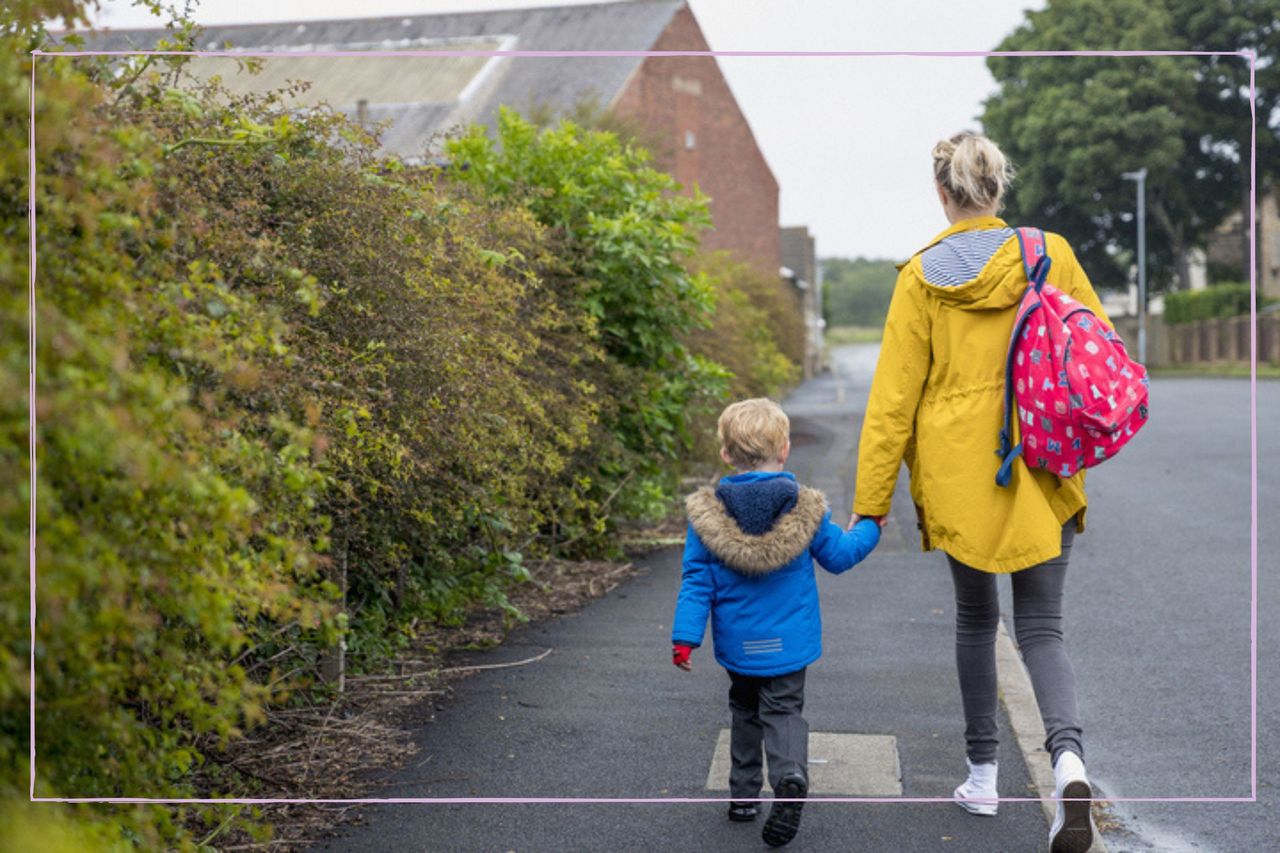My child is going to secondary school and I’m worried about losing my primary school mum friends
One mum shares how the transition can be just as tricky for parents


With my two children about to start secondary school, I'm worried about losing the friends I've made through primary - and, it's a more common concern than you'd think. An expert in loneliness shares what you do to feel less on your own if you feel the same.
I have two children aged 11 and 10, and the first is off to secondary school in September, closely followed by his brother the year after. This means in a short space of time I'll wave goodbye to the school that's been a part of our lives for over six years - and potentially, the 'mum friends' that have come with it. With the news that parental loneliness is soaring, and evolving societies mean best friends are no longer forever, this feels like a scary prospect.
For me, I've experienced periods of loneliness since I had children, and there's certainly a stigma attached to making that admission. However, I've found that saying it aloud and sitting with the feeling is far more healing than dwelling on feelings of 'failure,' or not being 'good enough.' Quite often, if you're brave enough to speak out, others will admit they feel exactly the same. It's getting the conversation started without concern for potential repercussions that's difficult.
My current fear is losing the friends I've made through primary school, as one of my children heads to secondary school in September and the other follows the year after. To better understand loneliness in parenthood, I spoke to Dr Antonia Ypsilanti, Associate Professor in Psychology at Sheffield Hallam University, who is also co-director of the Campaign to End Loneliness. Antonia tells us "For some women, pregnancy and parenthood can increase the sense of loneliness even though its often not explicitly discussed. For example, a study found that new mothers are reluctant to report feeling lonely because it makes them feel inadequate and marginalised.
"One of the reasons why parents may feel lonely is because they feel that they are not understood especially in marriages with high levels of martial dissatisfaction. In line with the wider literature, the evidence suggests that parents may be at risk of loneliness if they have a smaller social network to share their experiences, or they have negative thoughts about themselves and/or the ability to seek help."
My experience of parental loneliness
When I was pregnant with my first baby, I was terrified of being lonely. I didn't know anybody who had children, and had recently moved. I worked an hour from where I lived and had little access to colleagues with children outside of work, and the process of finding mum friends was very daunting. However, I relaxed after attending antenatal and NCT classes, because many others were in the same boat.
One particularly efficient NCT member even drew up a schedule of meetups, and designated dates and times each person was to organise an event - this felt like hitting the new mum friends jackpot. Through this and the carousel of classes I booked us into, me and my baby were never actually lonely at all.
GoodtoKnow Newsletter
Parenting advice, hot topics, best buys and family finance tips delivered straight to your inbox.
I was surprised - although I probably shouldn't have been - to find that once our new circle of friends returned to work, then had their hands tied with second babies, meetups became less and less frequent. Although we did try to have regular 'adult' get togethers at local bars and restaurants to make up for this. It was during one of these that felt particularly flat, that I made a realisation - we really were a group of people with very little in common who'd been thrown together by the fact we'd all fallen pregnant at the same time.
By the time my first child went to school, NCT meetups had dried up altogether and admittedly, I wasn't that sad about it. During my eldest's first year at school, it was pretty much just me and my youngest. I still wasn't working, and relied on my mum and snatched moments with any of my child-free friends during their working days for company. I was really lonely.
"I made a realisation - we really were a group of people with very little in common who'd been thrown together by the fact we'd all fallen pregnant at the same time."
By the end of this year and by the time my other child was about to start school, I had made some friends. Tentatively at first, because this time we hadn't come together with the more singular and emotive life event of being first time parents - some already had children at the school, some had multiple kids and others had one. It wasn't quite so easy to find a tribe, but the end of reception year saw one emerge.
Since then, there's been annual events - Christmas parties being a particular highlight - and supporting each other through a multitude of big birthdays and life events. As the end of primary school hovers near, I have the same nagging feeling: does that signal the end of these friendships?
Having lasted longer than the original NCT connections and gone the distance because we realised we actually liked one another and it was easy to put the time into getting together, what will happen if it all comes to an end? I have so many questions - will everyone else be sad if we don't see each other anymore? Am I the only one who feels this way? Does this happen to everyone when secondary school comes around? Am I overthinking it? Are all friendships nowadays temporary and do they just slip in and out of existence depending on the time of life?
Perhaps I have more invested in the friendships than others - I work entirely from home, which in itself can be lonely. People I know who already have kids at secondary school tell me there's no socialising for parents, and without the need to be at the school gates, they wouldn't have a clue who most of the parents were - this heightens my worries. Contact with pre-children friends is sporadic, a lot of them are only just having children or have very young ones, again putting us in wildly different life stages and making getting together around nap schedules and my kids' sport commitments impossible.
What I do know is that I'm not alone. Mum-of-three Carly, says "To me it felt final to be losing mum friends overall, with kids becoming self sufficient at secondary school… No school gate chats or WhatsApp groups. I'm grateful to have two still in primary school, but who knew I’d actually miss a Mums WhatsApp group?"
Fellow mother-of-three, Heidi, adds "Anyone I know with kids leaving primary this summer is already teary about it. With two of my own that have left secondary school I definitely had a wobble about the end of primary days and the implications that would have. It absolutely was the end of an era and quite shocking what a difference the change in routine made - for nine years I saw my primary school mum friends 5 days a week at pick up and drop off and most days we'd squeeze in a cheeky morning coffee or park play after school and then literally all of a sudden overnight our paths no longer crossed."
Maybe it all works itself out and I need to stop worrying so much. I should look to my own mum, who has spend the last couple of decades since I left home living her best life and meeting up with her friends like a giant social butterfly, for what to expect. Some are friends from school, and others she's found through the multitude of social events she's involved with. While I try and use her as a beacon of hope, I'll continue trying to alleviate myself of the fear and real possibility that loneliness exists and might happen to me again.
What to do if you're a parent who feels lonely
Loneliness expert Dr Antonia Ypsilanti, tells us chronic loneliness is experienced by approximately 30% of new parents but the exact causes remain unknown. Inconclusive evidence suggests parents of children with disabilities are more likely to experience loneliness, and marital dissatisfaction might impact other demographics experiencing feeling alone - this suggests more needs to be done to study the problem, which can be debilitating if not worked through.
Speaking about tackling loneliness, Antonia shares "Most interventions target social isolation and loneliness is a byproduct of these interventions. The difference between loneliness and social isolation is that you can experience loneliness even if you are in a crowd because the desired relationships and the quality of these relationships are not met. Even though there is a relationship between loneliness and social isolation they are inherently different."
Tips for alleviating loneliness include:
- Recognising that loneliness is very common among parents across the world.
- Identifying signs of loneliness and understanding where they are coming from (e.g., marital dissatisfaction or social isolation).
- Improving communication skills and forming social connections.
- Peer support groups (e.g., parents’ groups) that meet either face-to-face or online.
- Maintaining regular contact with friends and relatives.
- Self-guided acceptance practices that provide a sense of empowerment.
- Talking about loneliness particularly with a health care professional.
Along with loneliness, being a mother can make women feel inadequate if they aren't well supported. Along with mum guilt and the mental load, its no wonder parenthood can sometimes feel less than joyful.

Dr Ypsilanti is an Associate Professor in Cognitive Psychology/Psychobiology with a research focus on self-conscious emotions in lonely individuals and other psychological disorders, including anxiety disorders, insomnia, and depression. Her unique contribution is applying theories and research methods from cognitive psychology and neuroscience to empirically examine the nature, experience, and effects of loneliness.

Lucy is a mum-of-two, multi-award nominated writer and blogger with six years’ of experience writing about parenting, family life, and TV. Lucy has contributed content to PopSugar and moms.com. In the last three years, she has transformed her passion for streaming countless hours of television into specialising in entertainment writing. There is now nothing she loves more than watching the best shows on television and sharing why you - and your kids - should watch them.
-
 Why do I crave sugar? Causes of sugar cravings and how to stop them
Why do I crave sugar? Causes of sugar cravings and how to stop themIf you're someone who suffers from sugar cravings you'll know how hard it is to give up the sweet stuff. But you're not alone.
By Debra Waters Published
-
 Low sodium diet: the benefits of reducing salt and what foods to eat
Low sodium diet: the benefits of reducing salt and what foods to eatBy Emily-Ann Elliott Published